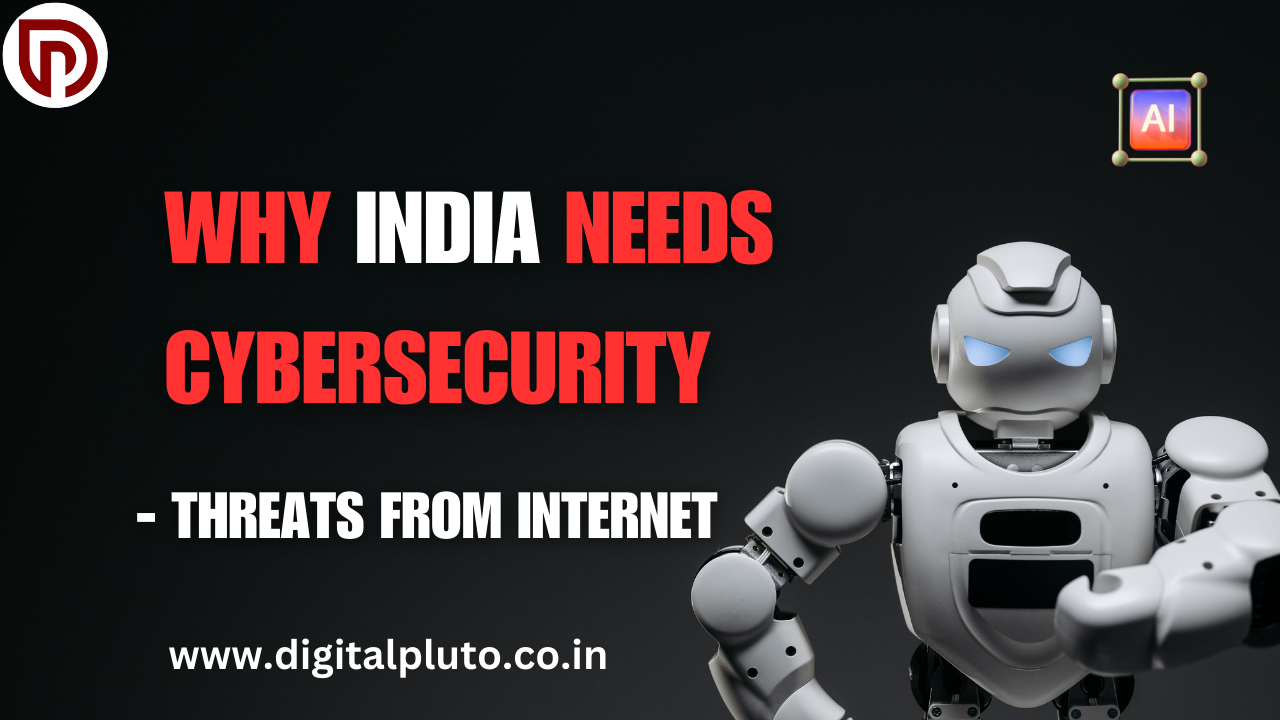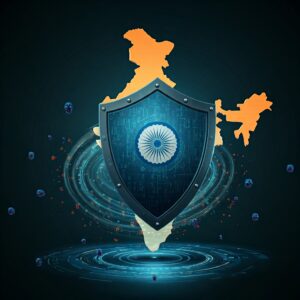
The Looming Threat: India’s Vulnerability to Cyber Attacks

India is being attacked, but not by the usual threats of bombs, missiles, or bullets. Our country’s security is being threatened by the enemy that lurks in the shadowy realm of the internet. India is directly targeted by cyberattacks, which have emerged as the new front in warfare. Let’s dive in and explore why India needs cybersecurity.
India has experienced a flurry of cyberattacks in recent years, targeting everything from our large banks and hospitals to the sacred grounds of ISRO and even our nuclear power plants. The frightening weaknesses of our vital infrastructure have been made clear by these tragedies, which the mainstream media has frequently covered.
These attacks are significantly more extensive than the usual website hacks and data leaks that we frequently connect with cybercrime. With more than 80% of banking transactions now taking place online and an astounding ₹72 lakh crore in transactions annually, India’s shift to a digital economy has made the nation a tempting target for hackers and cyber terrorists.
The Anatomy of Cyberattacks: Hacking, Malware, and Beyond
Hackers are becoming increasingly sophisticated in their methods, employing a range of techniques to infiltrate our systems and wreak havoc. These attacks can be broadly categorized into five main types:
- Hacking: Unauthorized access to computer systems or networks, leading to the theft or leakage of sensitive information.
- Malware Attacks: The deployment of malicious software that grants hackers control over infected systems, with the most dangerous being ransomware attacks that hold data hostage.
- Social Engineering: Psychological manipulation and emotional blackmail to trick victims into revealing sensitive information or granting access to systems.
- Phishing: Sophisticated scams that use seemingly legitimate sources, such as official email accounts, to lure victims into downloading malware or providing sensitive data.
- DDoS (Distributed Denial-of-Service): Attacks that overwhelm servers and disrupt critical services, as seen in the recent cyberattacks on major Indian airports.
With high-profile attacks at the AIIMS hospital in New Delhi and the Kudankulam Nuclear Power Plant in Tamil Nadu in recent years, these attacks have become more frequent. Hackers have used malware-infected emails to obtain sensitive papers and information, including the powerful ISRO, which is renowned for its top-notch technical capabilities.
The Alarming Rise of Cybercrime: A Lucrative Endeavor for Rogue Nations

With an estimated $10.5 trillion in losses worldwide, cybercrime has grown to be a profitable enterprise. After China and the United States, the cybersecurity industry would have the third-largest GDP if it were a nation.
It is concerning to note that a large amount of these illicit riches are going to rogue states like North Korea and Russia, who are utilizing the money to support their evil endeavors, such as the development of nuclear weapons and other military capabilities.
The serious repercussions of these intrusions are further highlighted by the recent disclosure that a DRDO scientist was honeytrapped by Pakistani intelligence services. Our national security is directly threatened by the theft of confidential data from India’s top defense research institute.
The interruption of vital infrastructure, monetary losses, and the financing of terrorist and military endeavors by our enemies are the three terrible effects of these cybercrimes that are why India needs cybersecurity.
Securing India’s Digital Future: Strategies for Strengthening Cybersecurity

With 31% of Indians currently victims of cyberattacks, the prospect of cybercrime is a serious concern as the country aims to become a $5 trillion economy. A thorough and multidimensional strategy is needed to protect our digital future.
Updating Legal Frameworks and Institutional Structures
India’s antiquated cybersecurity laws and practices need to be updated as the first step in tackling this issue. To better coordinate the nation’s efforts in this area, experts such as Dr. Pavan Duggal, a Supreme Court attorney and the chairman of the International Commission on Cyber Security Law, have argued for the establishment of a special Cybersecurity Ministry.
To keep up with the quickly changing threat landscape, India’s current cybersecurity strategy, which was created in 2013, desperately needs to be updated. Our primary piece of legislation in this field, the IT Act of 2000, likewise has to be significantly updated to handle the increasing complexity of cyberattacks.
Embracing Data Localization
The adoption of data localization regulations is another essential step in enhancing India’s cybersecurity. Indian user data is now stored in foreign countries by numerous digital companies, such as Facebook and Google, making it challenging for the government to monitor and regulate the use of this private data.
India must require the localization of personal data within the nation by using our geopolitical clout and passing new legislation. In addition to improving data security, this opens up new career prospects in the home data center sector.
Fostering Awareness, Education, and Training
Every individual must actively participate in cybersecurity; it is not solely the duty of the government and IT corporations. Increasing awareness, offering thorough instruction, and providing specialized training programs are all crucial to equipping people and organizations to fend off the always-changing threat of cyberattacks.
According to the Tenable research, some Indian firms have been vulnerable to the strategies of proficient hackers for years since they have neglected to fix identified flaws. The nation’s digital resiliency depends on closing this knowledge gap and fostering a culture of cybersecurity alertness. That’s why India needs cybersecurity.
Leveraging Partnerships and Technological Advancements
To strengthen its cybersecurity defenses against these formidable obstacles, India must also look into strategic alliances and make use of cutting-edge technologies.
International Collaboration and Knowledge Sharing
A coordinated worldwide approach is necessary to address the global challenge of cybersecurity. To counter the shared threat of cyberattacks, India should aggressively cooperate with its partners and allies in exchanging technology solutions, best practices, and intelligence.
By encouraging cooperation, India may benefit from the knowledge and assets of other countries, enhancing its capacity to identify, stop, and effectively address cyberthreats.
Embracing Cutting-Edge Technologies
Rapid developments in domains like blockchain, machine learning, and artificial intelligence (AI) offer fresh chances to improve India’s cybersecurity capabilities. These technologies can be used to provide resilient vital infrastructure, safe data transmission and storage, and strong threat detection and response systems.
India can keep up with the constantly changing strategies of nation-state actors and cybercriminals by funding the study and development of these innovative technologies.
Conclusion: A Call to Action for a Secure Digital India
The title says why India needs cybersecurity, Cybercrime poses a serious and immediate threat to India’s national security and economy, making it more than just a problem. It is crucial to address this issue as India aims to become a $5 trillion economy and a worldwide leader in the digital era.
India may strengthen its digital defenses and establish its legitimate position in the global arena of the twenty-first century by adopting a thorough and proactive strategy that involves the public, corporate sector, and government. The future of a safe and successful Digital India is at stake, so now is the moment to take action.
To stay up-to-date on the latest developments in India’s cybersecurity landscape, be sure to check out the Abhi and Niyu YouTube channel. Their insightful videos, like the one on the “Freedom 251” smartphone scam, provide valuable insights and analysis on the evolving threats and solutions in this critical domain.
Remember, the fight against cybercrime is a collective responsibility. By staying informed, advocating for policy changes, and embracing the latest technological advancements, we can all contribute to the creation of a safer and more secure digital future for India.
Follow https://www.digitalpluto.co.in/ for more latest updates about digital marketing.





